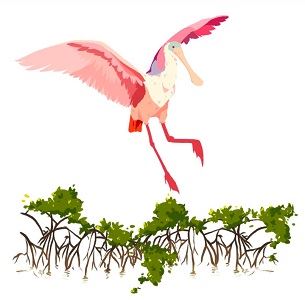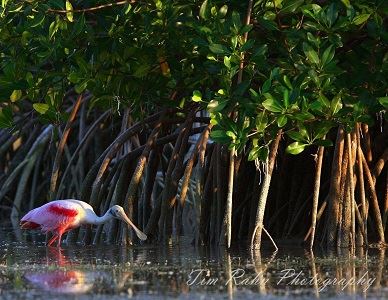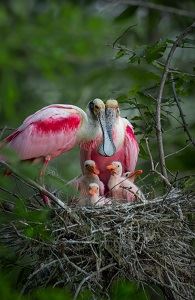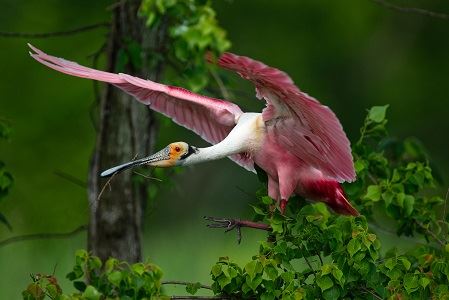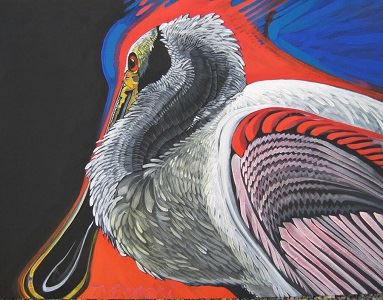|
|
OUR SYMBOL: THE STUNNING ROSEATE SPOONBILL |
|
The Islamorada Community Alliance was formed in 2021: organized to provide the residents of the Village with a way to communicate, educate and improve the local decisions that impact our quality of life. The Alliance has created a logo, using the roseate spoonbill as its symbol. Why is the roseate spoonbill significant?
According to the Audubon website, “The roseate spoonbill shorebird is a local indicator species—a canary in the coal mine. If the spoonbill is not doing well, that tells us there is a problem in the ecosystem. If the spoonbill is recovering, it indicates that water management restoration efforts in the Everglades are working.” Now the birds are protected, so hunters are no longer the problem. But, Florida Bay isn’t as healthy as it once was. We occasionally have the vibrant birds visit us in Islamorada, but their visits are not as common as we’d like or as they used to be. We, humans, have destroyed much of their habitat. But, they are resilient and they have the sense to move on to new habitats. Should we as residents of Islamorada also move on as traffic continues to get worse, when the workforce can no longer afford the rents, when the boats and partiers at the sandbar destroy the peace and quiet, when the trash and human waste at the Fills become unbearable? No. We need to be as resilient and feisty as the roseate spoonbill. The spoonbill can’t fix its habitat. But, we can do lots of things to make our very special community better. So, let’s join together using the Islamorada Community Alliance to advocate for our Village and its residents. Study the strengths and the weaknesses. Advocate for ethics, accountability, and transparency. Join us. It’s a battle worth fighting. Unfortunately, the battle isn’t over for the roseate spoonbill either. An article in the November 2020 Audubon Magazine warns of potential trouble ahead in Florida for the wading birds that depend on wetlands. We need to fight for our environment. Click here: In Florida's Plan to Take Over Wetland Permits, Critics See a Gift to Developers | Audubon |
Local spoonbill photo by Tim Rahn | The colors of the roseate spoonbill are so gorgeous at a distance, but the bird is a bit bizarre up close! Spoonbills feed in shallow waters, walking forward slowly while swinging their heads from side to side, sifting through the muck with their wide flat bills, stirring up whatever they can find for one delicious muddy meal. Don't we wish that more spoonbills would come back to Islamorada and make it their permanent home? What a colorful addition that would be. If you love the special and unique Florida Keys, be sure to stop at Robbie's to see the birds and the fish photographed by Tim Rahn, a local photographer. |
Photo by Tim Rahn, capturing the bizarre! |
Are you curious about these fascinating birds? Here are some facts from the from the Audubon Guide: Conservation Status Very common in parts of the southeast until the 1860s, spoonbills were virtually eliminated from the United States as a side-effect of the destruction of wader colonies by plume hunters. Began to re-colonize Texas and Florida early in 20th century. Still uncommon and local, vulnerable to degradation of feeding and nesting habitats. Migration Present all year in coastal Texas but more common in summer, with some migrating to Mexico in winter. There is thought to be some regular seasonal movement between Florida and Cuba. After breeding season, a few (mostly immatures) may stray far north and well inland. Feeding Behavior Forages by wading in shallow muddy water, sweeping bill from side to side with mandibles slightly open, detecting prey by feel. Sometimes picks up items that it has found by sight. Eggs 2-3, sometimes 1-5. White, spotted with brown. Incubation is by both sexes, 22-24 days. Young Both parents feed young. Young clamber about near the nest, and may leave nest after 5-6 weeks. They are capable of strong flight at roughly 7-8 weeks. Diet Small fish, aquatic invertebrates. Diet is mostly small fish such as minnows, also shrimp, crayfish, crabs, aquatic insects (especially beetles), mollusks, slugs. Eats some plant material, including roots and stems of sedges. Nesting Breeds mainly during winter in Florida. Nests in colonies. At beginning of breeding season, entire flock may suddenly fly up, for no apparent reason, and circle the area. In courtship, male and female first interact aggressively, later perch close together, present sticks to each other, cross and clasp bills. Nest site is in mangroves, trees, shrubs, usually 5-15' above ground or water, sometimes on ground. Nest (built mostly by female, with material brought by male) a bulky platform of sticks, with deep hollow in center lined with twigs, leaves. |
|
|
What a prize - a flamboyant roseate spoonbill by famed artist Tim Borski T. Borski Art Gallery - HOME (timborskiart.com) Tim Borski, 2015 International Game Fish Association artist of the year, paints unique wildlife art primarily in acrylics and oil. | 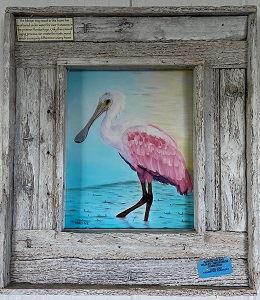 Nadine and Glenn Lahti's Lobster Trap Art Gallery a unique art gallery and gift shop in Islamorada. This is a painting by Nadine of the beloved spoonbill. |
Above: Jill Zima Borski of Islamorada painted these roseate spoonbills after a visit to the Florida Keys Wild Bird Center at Mile Marker 94 Bayside, in Tavernier. The scenic sky, mangroves, water and bird life inspired this painting. At right, Tim Borski (www.timborskiart.com) portrayed a roseate beside mangroves in yet another dramatic way. Below: Islamorada resident Robert Moser acquired this roseate painting signed by Patricia at an Audubon Society auction. |
|


